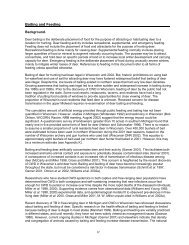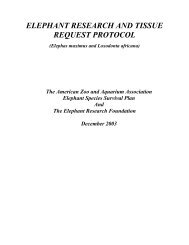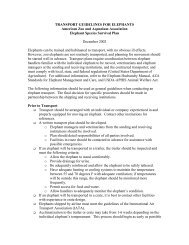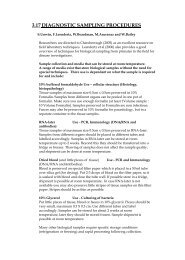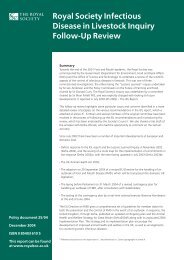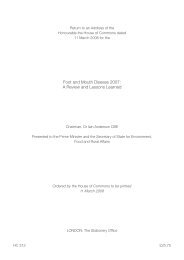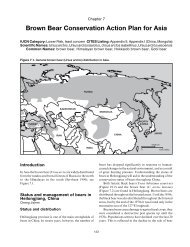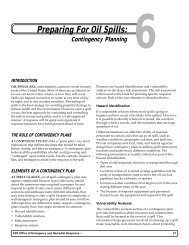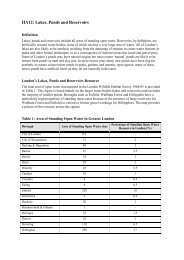Elephants Elephants - Wildpro - Twycross Zoo
Elephants Elephants - Wildpro - Twycross Zoo
Elephants Elephants - Wildpro - Twycross Zoo
You also want an ePaper? Increase the reach of your titles
YUMPU automatically turns print PDFs into web optimized ePapers that Google loves.
populations using this method; the method is also very time-consuming and<br />
labour-intensive. <strong>Elephants</strong> have also been counted using transect line<br />
techniques, however dung counts are reckoned to be the most accurate<br />
(Barnes 2001). A study in Tamilnadu in India compared direct-count transect<br />
methods with dung counts (Varman et al 1995). This found that although<br />
direct counts were faster they tended to overestimate elephant numbers; direct<br />
counts are very difficult to conduct in forest habitats. A good summary of the<br />
methodology using dung counts is given in Davies (2002).<br />
ELEPHANT POACHING<br />
Poaching for ivory is a problem for both African and Asian elephants, but<br />
probably greater for the African owing to the fact that females also have tusks.<br />
Ivory has been a valued substance from time immemorial and humans have<br />
been making and trading in ivory artefacts from some 10,000 years. As males<br />
tend to be poached more than females this can have a long term effect on the<br />
sex ratio of populations. Tuskers in southern India have been particularly<br />
badly hit (Sukumar et al 1998) and only abut 7.5% of bulls in Sri Lanka are<br />
tuskers (Santiapillai et al 1999). A survey carried out in Asian countries in<br />
1999 [Stiles & Martin 2002 #1680] found worked ivory for sale throughout<br />
Asia. In Thailand more items were found for sale than in four African<br />
countries (which included Egypt) and imported African elephant ivory was<br />
also found. In Nepal, India and Sri Lanka, where there is a total ban, very<br />
little worked ivory was on display in shops [Stiles & Martin 2002 #1680]. The<br />
ivory trade is thought to be the major cause of the drop in population of<br />
African elephants from an estimated 1.3 million in 1979 to around 626,000 in<br />
1989 (Douglas-Hamilton 1987). Milner-Gulland (1994) examined rates of<br />
decline of the African elephants which indicated that the rapid decline since<br />
1950, particularly from 1970, was due to the increase in poaching for the Far<br />
Eastern ivory markets. This increase started to drop around 1987. Egypt is<br />
considered the major African country selling illegal ivory, much of it poached<br />
in central and West Africa (Martin 2000). A survey carried out in Africa<br />
showed that the prices for ivory decreased as a result of the ban but there is<br />
still significant trade throughout the continent (Stiles and Martin 2001).<br />
Although elephant hides are traded TRAFFIC research has failed to uncover<br />
any linkages between elephant poaching and the trade in hides<br />
(www.traffic.org).<br />
Elephant culling has effects on social organization and behaviour due to the<br />
fact that animals with larger tusks are selected first. It has been estimated that<br />
336-388 tuskers have been poached over a 20 year period from the Periyar<br />
Reserve of southern India (Sukumar et al 1998). This has resulted in a<br />
depletion of the male population and a drop in fecundity of females. It also<br />
appeared that a proportion of females, older than 15, were non-reproductive.<br />
Similar evidence from Africa shows populations with skewed sex ratios (50<br />
females to one male) and the proportion of females showing signs of<br />
pregnancy and accompanied by recent offspring being reduced (Dobson and<br />
Poole 1998). Evidence from Queen Elizabeth Park in Uganda suggested that<br />
social structure was breaking down caused by stress due to factors like<br />
excessive poaching. Heavily poached populations characteristically have<br />
21



